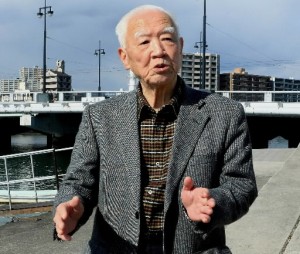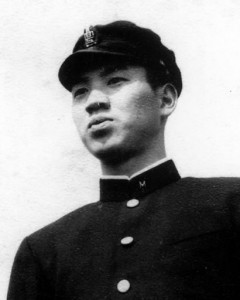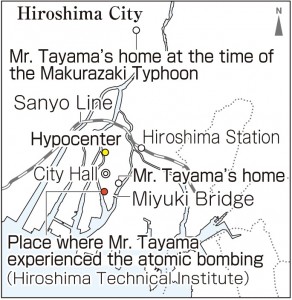Survivors’ Stories: Kazuo Tayama, 88, Naka Ward, Hiroshima
Mar. 7, 2016
Despite poor health, made enormous efforts for his family
by Hiroyuki Taniguchi, Staff Writer
Kazuo Tayama, 88, forged on with his life after the atomic bombing out of the sheer desire to aid his family. In 1945, when the atomic bomb was dropped on the city of Hiroshima, Mr. Tayama was 18 years old and a second-year student at the Hiroshima Technical Institute (now the Faculty of Engineering at Hiroshima University). After losing his father earlier in his life, there were four people in his family: his mother, his two younger sisters, and himself. After the bombing, he moved with them from place to place while suffering from poor health. “I couldn’t afford to say I was having a hard time,” he said, recalling those days. “I managed to hold up physically.”
On the morning of August 6, he was at school in Sendamachi (now part of Naka Ward), about 2 kilometers from the hypocenter. While near a window on the second floor of the school building, he felt an intense whitish-blue flash of light. As he instinctively thrust his head beneath a desk, there was a great boom and blast. When he came to, there was darkness around him. He managed to struggle out of the building, now on the verge of collapse. He suffered burns to the left side of his face and his chest, along with cuts and bruises.
He and two friends headed toward Miyuki Bridge. Along the way, he learned that the Hirano-machi district (now part of Naka Ward), where his house was located, was in flames.
In the vicinity of the bridge, he saw people with disheveled hair, others in tattered clothes, and some who could not even be identified, due to their burns and injuries, as male or female. There were people who had collapsed to the ground after reaching the bridge, while others were walking with their arms thrust out, their burnt skin peeling away and dangling down. “I wondered what had happened,” Mr. Tayama said. “It was so terrible, so miserable. I was overcome by a feeling that I can’t explain.”
Mr. Tayama and his friends jumped onto a rescue boat that arrived at the left bank of the Kyobashi River and ventured on to Ujina (now part of Minami Ward). With the help of an officer of the Imperial Japanese Army’s Shipping Command, who saw the caps of their school uniform and spoke to them, they were able to receive first aid and a bed.
Anxious about his family, Mr. Tayama left Ujina earlier than the others that evening. He headed toward Furuichi because his family had planned to flee to an acquaintance’s home either in Furuichi (now part of Asaminami Ward) or in Ajina (now part of Hatsukaichi City) in the event of an emergency.
To ward off the heat from the fires, he soaked his shirt in a cistern. Thinking that many graceful-shaped trees had been burned, he realized, on closer inspection, that they were actually charred corpses. When he turned toward the south from the area of Hiroshima Station, he caught a full view of the factories of Mitsubishi Heavy Industries in Kanon and Ebayama Hill, which were normally hidden behind other buildings. Something dreadful has happened, he thought, with the entire city transformed into burnt ruins. He was perplexed, wondering how many bombs had been dropped on Hiroshima.
Mr. Tayama arrived at the acquaintance’s home in Furuichi late that night, but his mother and sisters were not there. The following day, August 7, he ventured to his home in Hiranomachi and found that it had burned down. Returning to the acquaintance’s home, he was reunited with his mother and sisters, learning that they had arrived there while he was out. After his relief at knowing they were safe, he fell unconscious for two days.
On the night of August 9, he awoke to find his mother by his side. Though he was still only semi-conscious, his body lethargic, the family headed to Ajina. After that, they went to Furuichi again, the city of Iwakuni, and the city of Himeji in Hyogo Prefecture. These moves continued until the end of that year.
While in Furuichi in September, the house where they were renting a room became flooded above the floorboards by the powerful Makurazaki Typhoon. At midnight, he helped his family flee by pulling each one of them over a wooden fence, a dangerous ordeal.
Mr. Tayama faced an uncertain future, and poor health, as he struggled through a series of hardships. But with each challenge, he would gather his strength and urge himself on, as the eldest son. Two years later, he landed a job and built a shack where their home had once stood.
Unfortunately, the company he joined folded four months later. But after that, he founded an automobile sales business with his former supervisor and they made the company a success, with Mr. Tayama later serving as president. He lived a feverish life, full of ups and downs.
Recalling his A-bomb experience of 71 years ago, Mr. Tayama said, “I can’t forgive that attack, which stole away the lives of so many innocent people.” He added, “The cause of all this was the war we waged. I can accept differences of opinion, but war is unacceptable.” He hopes that the countries of the world will show more determination to avoid waging war.
Teenagers’ Impressions
A-bombing stole away people’s daily lives
Though Mr. Tayama himself was injured, he helped classmates who were pinned under a beam, and did his utmost to find a place for his family to live despite suffering from a fever. I thought he was remarkable. If I were him, my mind would be preoccupied with my own concerns. I’m sure there were a lot of people like me at the time of the atomic bombing. An atomic bomb, which destroyed people’s daily lives, should never have been used. (Riho Kito, 14)
Do my best not to cause conflict
Mr. Tayama witnessed the devastation caused by the atomic bombing, which made innocent people suffer, and after that he and his family moved from place to place. I think he must have endured a lot of mental and physical hardships. He stressed to us, “The cause of all this was the war we started. We must not wage war.” I want to do my best not to cause conflicts, starting with the world around me. (Yoshiko Hirata, 14)
Want to convey his experience
After the atomic bombing, Mr. Tayama struggled to assist his family, and pushed himself so hard. This came from the sense of responsibility he felt as the eldest son. His life contrasts sharply with ours because we can focus on anything we like, including the chance to study. Back then, he was at the age when he probably wanted to do what he liked, too. The atomic bombing prevented him from doing this. I want to convey the horror of the atomic bombing to others, including his experience, such as the fact that he mistook charred bodies for burnt trees. (Shunichi Kamichoja, 15)
(Originally published on March 7, 2016)
by Hiroyuki Taniguchi, Staff Writer
Kazuo Tayama, 88, forged on with his life after the atomic bombing out of the sheer desire to aid his family. In 1945, when the atomic bomb was dropped on the city of Hiroshima, Mr. Tayama was 18 years old and a second-year student at the Hiroshima Technical Institute (now the Faculty of Engineering at Hiroshima University). After losing his father earlier in his life, there were four people in his family: his mother, his two younger sisters, and himself. After the bombing, he moved with them from place to place while suffering from poor health. “I couldn’t afford to say I was having a hard time,” he said, recalling those days. “I managed to hold up physically.”
On the morning of August 6, he was at school in Sendamachi (now part of Naka Ward), about 2 kilometers from the hypocenter. While near a window on the second floor of the school building, he felt an intense whitish-blue flash of light. As he instinctively thrust his head beneath a desk, there was a great boom and blast. When he came to, there was darkness around him. He managed to struggle out of the building, now on the verge of collapse. He suffered burns to the left side of his face and his chest, along with cuts and bruises.
He and two friends headed toward Miyuki Bridge. Along the way, he learned that the Hirano-machi district (now part of Naka Ward), where his house was located, was in flames.
In the vicinity of the bridge, he saw people with disheveled hair, others in tattered clothes, and some who could not even be identified, due to their burns and injuries, as male or female. There were people who had collapsed to the ground after reaching the bridge, while others were walking with their arms thrust out, their burnt skin peeling away and dangling down. “I wondered what had happened,” Mr. Tayama said. “It was so terrible, so miserable. I was overcome by a feeling that I can’t explain.”
Mr. Tayama and his friends jumped onto a rescue boat that arrived at the left bank of the Kyobashi River and ventured on to Ujina (now part of Minami Ward). With the help of an officer of the Imperial Japanese Army’s Shipping Command, who saw the caps of their school uniform and spoke to them, they were able to receive first aid and a bed.
Anxious about his family, Mr. Tayama left Ujina earlier than the others that evening. He headed toward Furuichi because his family had planned to flee to an acquaintance’s home either in Furuichi (now part of Asaminami Ward) or in Ajina (now part of Hatsukaichi City) in the event of an emergency.
To ward off the heat from the fires, he soaked his shirt in a cistern. Thinking that many graceful-shaped trees had been burned, he realized, on closer inspection, that they were actually charred corpses. When he turned toward the south from the area of Hiroshima Station, he caught a full view of the factories of Mitsubishi Heavy Industries in Kanon and Ebayama Hill, which were normally hidden behind other buildings. Something dreadful has happened, he thought, with the entire city transformed into burnt ruins. He was perplexed, wondering how many bombs had been dropped on Hiroshima.
Mr. Tayama arrived at the acquaintance’s home in Furuichi late that night, but his mother and sisters were not there. The following day, August 7, he ventured to his home in Hiranomachi and found that it had burned down. Returning to the acquaintance’s home, he was reunited with his mother and sisters, learning that they had arrived there while he was out. After his relief at knowing they were safe, he fell unconscious for two days.
On the night of August 9, he awoke to find his mother by his side. Though he was still only semi-conscious, his body lethargic, the family headed to Ajina. After that, they went to Furuichi again, the city of Iwakuni, and the city of Himeji in Hyogo Prefecture. These moves continued until the end of that year.
While in Furuichi in September, the house where they were renting a room became flooded above the floorboards by the powerful Makurazaki Typhoon. At midnight, he helped his family flee by pulling each one of them over a wooden fence, a dangerous ordeal.
Mr. Tayama faced an uncertain future, and poor health, as he struggled through a series of hardships. But with each challenge, he would gather his strength and urge himself on, as the eldest son. Two years later, he landed a job and built a shack where their home had once stood.
Unfortunately, the company he joined folded four months later. But after that, he founded an automobile sales business with his former supervisor and they made the company a success, with Mr. Tayama later serving as president. He lived a feverish life, full of ups and downs.
Recalling his A-bomb experience of 71 years ago, Mr. Tayama said, “I can’t forgive that attack, which stole away the lives of so many innocent people.” He added, “The cause of all this was the war we waged. I can accept differences of opinion, but war is unacceptable.” He hopes that the countries of the world will show more determination to avoid waging war.
Teenagers’ Impressions
A-bombing stole away people’s daily lives
Though Mr. Tayama himself was injured, he helped classmates who were pinned under a beam, and did his utmost to find a place for his family to live despite suffering from a fever. I thought he was remarkable. If I were him, my mind would be preoccupied with my own concerns. I’m sure there were a lot of people like me at the time of the atomic bombing. An atomic bomb, which destroyed people’s daily lives, should never have been used. (Riho Kito, 14)
Do my best not to cause conflict
Mr. Tayama witnessed the devastation caused by the atomic bombing, which made innocent people suffer, and after that he and his family moved from place to place. I think he must have endured a lot of mental and physical hardships. He stressed to us, “The cause of all this was the war we started. We must not wage war.” I want to do my best not to cause conflicts, starting with the world around me. (Yoshiko Hirata, 14)
Want to convey his experience
After the atomic bombing, Mr. Tayama struggled to assist his family, and pushed himself so hard. This came from the sense of responsibility he felt as the eldest son. His life contrasts sharply with ours because we can focus on anything we like, including the chance to study. Back then, he was at the age when he probably wanted to do what he liked, too. The atomic bombing prevented him from doing this. I want to convey the horror of the atomic bombing to others, including his experience, such as the fact that he mistook charred bodies for burnt trees. (Shunichi Kamichoja, 15)
(Originally published on March 7, 2016)










